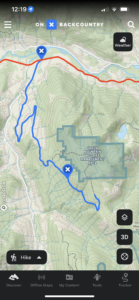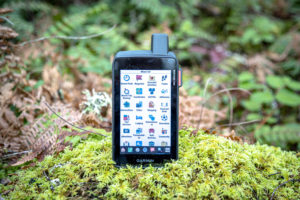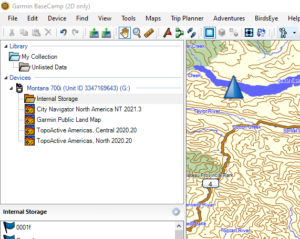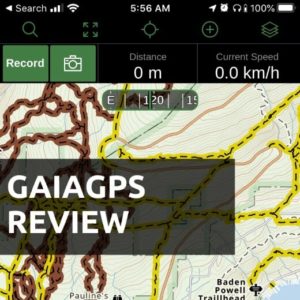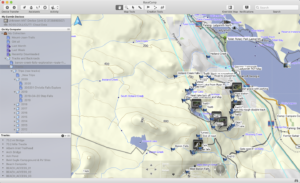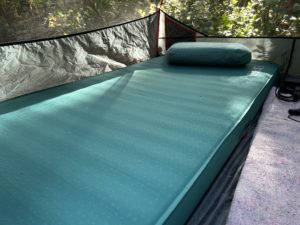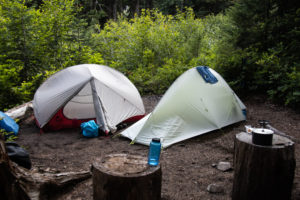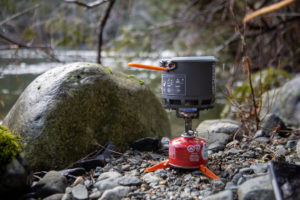GPS is a term thrown around a lot these days but when it all comes down to it, something with GPS can show where you are on a map.
In this article:

What is a GPS?
GPS stands for Global Positioning System. It’s a series of satellites floating around the earth that talks to an antennae in your GPS unit or phone. Using the signal from multiple satellites and some very complicated math, the GPS can figure out where you are on a map.
When you have a clear view of the sky, the GPS can clearly see more satellites and it’s location will be more accurate. If you are in dense tree cover, amongst many buildings or in a canyon, there aren’t as many satellites to see and accuracy will be lower.
GPS and cell reception
GPS connection and cell reception on your phone are different things. You can have a GPS connection to the satellites but be too far from any cell tower to get voice or date for your phone. This is important for map data.
GPS apps on your phone usually need two things: GPS reception to figure out where you are and data connection to download maps. If there’s no data to download maps then your phone will know where you are but can’t download the street or terrain maps to show it. But most apps can go offline to solve this.
When you download maps offline, you’re eliminating the need for data when you’re off the grid. When the maps are downloaded to your phone, you won’t need a data connection, just GPS. If you move into a new area where you don’t have maps downloaded, then you won’t be able to see anything. Some apps automatically download these maps for you, but for most, you have to find the download option and pick which ones you want.
GPS units vs phone apps
Right now there are 2 main groups of GPS: dedicated GPS units and phones.
Dedicated GPS are like a Garmin 64 series GPS that are just a GPS. That is it’s only function. They will show you a map, track where you’ve been and let you navigate to waypoints and routes.
Phones obviously do a lot more. With an app on your phone you can see your location on a map, track where you’ve been, navigate to waypoints and routes and take photos. After you’re done, you can use everything else on your phone or upload the tracks and images to websites online.
Check out a few of our GPS phone app reviews:
Dedicated GPS usually have larger GPS antennae than phones do and so can connect to more satellites for a more accurate signals. They also can have much better battery life. Dedicated GPS usually have battery life measured in days where as phone battery life is measured in hours when using the GPS.
GPS Articles
GPS is an in-depth topic. Dig in to these other articles.
- OnX Backcountry GPS App ReviewGPS is a critical but tricky item to take into the backcountry. It’s a set of maps and tracks in… Read More »OnX Backcountry GPS App Review
- Garmin Montana 700i GPS ReviewWith a massive 5” screen and inReach satellite communicator built-in, the Montana 700i can go in the car and on the trail for any adventure.
- Garmin Basecamp: Send a track to your GPS
After you have created a GPS track on your computer, this is how to get it onto your Garmin GPS.
- Gaia GPS App ReviewWith the switch to phones for everything these days, it’s no wonder everyone is using them for GPS as well. … Read More »Gaia GPS App Review
- Satellite Communication: Can a GPS unit help you get rescued? (Part 2)There are 4 parts to this series: Intro: Satellite Communication GPS: Can they get you rescued? (this article) Spot vs… Read More »Satellite Communication: Can a GPS unit help you get rescued? (Part 2)
- 15 Ways to Extend your GPS Battery LifeGPS can be a blessing when you’re out adventuring but they have an achilles heel that can get you into… Read More »15 Ways to Extend your GPS Battery Life
- Garmin Basecamp Series: Everything you need to know about Garmin’s GPS SoftwareGPS are becoming so popular these days with avid outdoors people and folks cruising around cities. If you own a… Read More »Garmin Basecamp Series: Everything you need to know about Garmin’s GPS Software
- Garmin Montana 600 GPS ReviewThis first part is a bit of a story about the demise of my Garmin Colorado 300. Skip to the… Read More »Garmin Montana 600 GPS Review
Other Backpacking Gear
You’ll need more than just a GPS to head out backpacking. Here are guides to all the other gear you need for backpacking.
- EXPED MegaMat LXW Sleeping Pad ReviewCamping is so much better when you get a good night sleep. With backpacking, hiking all day almost guarantees a good night sleep. But with camping you may not be… Read More »EXPED MegaMat LXW Sleeping Pad Review
- Backpacking Gear for Beginners CourseWelcome to the Backpacking Gear for Beginners Course. This course will walk you through every piece of hiking gear you might need for a short backpacking trip. We’ll cover what… Read More »Backpacking Gear for Beginners Course
- Backpacking Gear for Beginners: DishesThis post is part of the Backpacking Gear for Beginners course. Why do you need dishes? You probably want to eat while you’re backpacking, right? That usually requires something to eat on… Read More »Backpacking Gear for Beginners: Dishes
- Backpacking Gear for Beginners: Water BladderThis post is part of the Backpacking Gear for Beginners course. Why do you need a water bladder? A water bladder is a plastic bag of water that sits in… Read More »Backpacking Gear for Beginners: Water Bladder
- Backpacking Gear for Beginners: Camp StoveThis post is part of the Backpacking Gear for Beginners course. Why do you need a stove? There are 2 ‘camps’ when it comes to bringing a stove or not hiking. Some… Read More »Backpacking Gear for Beginners: Camp Stove
- Backpacking Gear for Beginners: Stuff SacksThis post is part of the Backpacking Gear for Beginners course. Why do you need stuff sacks? Jamming everything you need to hike for 4 days or a week into 1 big… Read More »Backpacking Gear for Beginners: Stuff Sacks
- Backpacking Gear for Beginners: GaitersThis post is part of the Backpacking Gear for Beginners course. Why do you need gaiters? Gaiters are like jackets for your hiking boots. They wrap around the top of… Read More »Backpacking Gear for Beginners: Gaiters
- Backpacking Gear for Beginners: Stove FuelThis post is part of the Backpacking Gear for Beginners course. Why do you need fuel? Stoves need fuel to burn. What kind of fuel you need depends on your stove. Canister… Read More »Backpacking Gear for Beginners: Stove Fuel
- Backpacking Gear for Beginners: BookThis post is part of the Backpacking Gear for Beginners course. Why do you need a book? I always have a book when I’m backpacking. This is absolutely optional but there’s something… Read More »Backpacking Gear for Beginners: Book
- Backpacking Gear for Beginners: MapThis post is part of the Backpacking Gear for Beginners course. Why do you need a map? Navigation is one of the 10 Essentials. You always need a way to… Read More »Backpacking Gear for Beginners: Map
- Backpacking Gear for Beginners: Notebook and PenThis post is part of the Backpacking Gear for Beginners course. Why do you need a notebook and pen? I love taking notes of what happened on my trips. I journal a… Read More »Backpacking Gear for Beginners: Notebook and Pen
- Backpacking Gear for Beginners: CompassThis post is part of the Backpacking Gear for Beginners course. Why do you need a compass? Some maps show trails, lake names and mountain names on them and may… Read More »Backpacking Gear for Beginners: Compass
- Backpacking Gear for Beginners: Coffee MakerThis post is part of the Backpacking Gear for Beginners course. Why do you need a coffee maker? I don’t go far without my Aeropress coffee maker but it’s big to bring… Read More »Backpacking Gear for Beginners: Coffee Maker
- Backpacking Gear for Beginners: CameraWhy do you need a camera? Another optional piece of gear. I don’t go on many trips without a camera though. It’s an excellent tool for documenting trips. Phone cameras… Read More »Backpacking Gear for Beginners: Camera
- Backpacking Gear for Beginners: Trekking PolesThis post is part of the Backpacking Gear for Beginners course. Why do you need trekking poles? Trekking poles are walking sticks with soft handles, like ski poles. Sometimes they… Read More »Backpacking Gear for Beginners: Trekking Poles
- Backpacking Gear for Beginners: Water filter, drops and tabletsThis post is part of the Backpacking Gear for Beginners course. Why do you need a water filter? No matter where you are, there’s a chance the water source can have protozoa… Read More »Backpacking Gear for Beginners: Water filter, drops and tablets
- Backpacking Gear for Beginners: RopeThis post is part of the Backpacking Gear for Beginners course. Why do you need rope? Rope can be a very useful thing to have on the trail. It has many uses… Read More »Backpacking Gear for Beginners: Rope
- Backpacking Gear for Beginners: HeadlampThis post is part of the Backpacking Gear for Beginners course. Why do you need a headlamp? Around camp and possibly on the trail, you’ll need light to see. A… Read More »Backpacking Gear for Beginners: Headlamp
- Backpacking Gear for Beginners: FoodThis post is part of the Backpacking Gear for Beginners course. Why do you need food? Well, we need food to survive so I guess we’re taking it. The trick for backpacking… Read More »Backpacking Gear for Beginners: Food
- Backpacking Gear for Beginners: MusicThis post is part of the Backpacking Gear for Beginners course. Why do you need a music player? You don’t. If you like music and it’s going to be a long trip… Read More »Backpacking Gear for Beginners: Music
